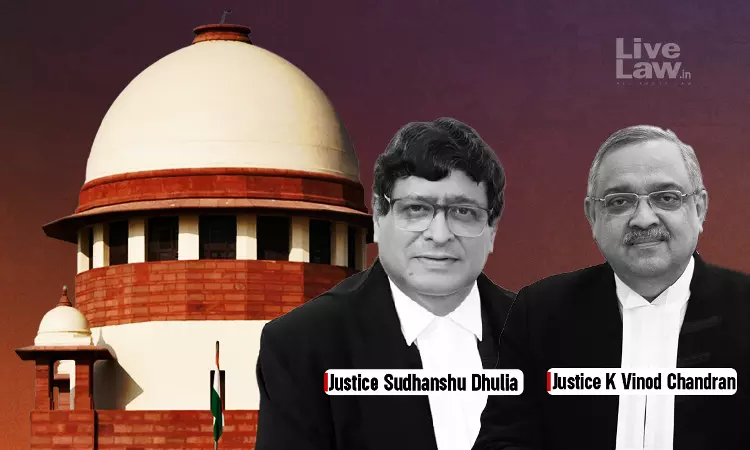- Home
- /
- Supreme court
- /
- Defective Investigation Does Not...
Defective Investigation Does Not Automatically Vitiate Prosecution's Case, If Other Relevant Evidence Exists: Supreme Court
Yash Mittal
21 April 2025 11:29 AM IST
The Supreme Court recently observed that the flaws in the investigation would not automatically be fatal to the prosecution's case when other credible evidence exists. The Court, affirming this position, upheld the conviction of the Appellant, who had sought acquittal on the ground of a faulty investigation. However, upon carefully examining the record and finding other reliable and...
The Supreme Court recently observed that the flaws in the investigation would not automatically be fatal to the prosecution's case when other credible evidence exists.
The Court, affirming this position, upheld the conviction of the Appellant, who had sought acquittal on the ground of a faulty investigation. However, upon carefully examining the record and finding other reliable and credible evidence that clearly established the Appellant's guilt, the Court refused to extend the benefit of doubt.
In support, the Court referred to State of Karnataka v. K. Yarappa Reddy, (1999) 8 SCC 715, wherein it was held that even if the integrity of the investigation is questionable, the remaining evidence must be meticulously scrutinised to ensure that the course of criminal justice is not derailed.
The Court further observed that mere defects or irregularities in the investigation do not automatically vitiate the prosecution's case; rather, if sufficient crucial material is found upon careful examination, a conviction may still be sustained.
"The High Court rightly relied on State of Karnataka v. K. Yarappa Reddy , to find that even when the probity of investigation is suspect, the rest of the evidence must be scrutinised meticulously to ensure that criminal justice is not rendered a causality."
Background
The bench comprising Justices Sudhanshu Dhulia and K Vinod Chandran heard the case where the Appellant, along with other accused persons was convicted by the trial court under Sections 143, 147, 323, 324, 427, 449, and 302 read with Sections 149 & 120B IPC and was sentenced to the death penalty.
The High Court upheld the Appellant's conviction but modified his conviction to 304 Part II read with 120B IPC sentencing him to suffer 5 years rigorous imprisonment (Section 450/120B) and 10 years rigorous imprisonment (Section 304 Part II/120B) with fines.
Aggrieved by the High Court's decision, the Appellant approached the Supreme Court contending that the investigation was carried on in a faulty manner, as his name was included in the FIR as an afterthought, and the witness statements under Section 164 Cr.P.C. was not recorded as a routine course, but only after the judicial intervention.
Decision
Affirming the High Court's decision, the judgment authored by Justice Chandran, instead of dismissing the case at the outset because the investigation was tainted, meticulously examined other relevant evidence crucial to hold the Appellant guilty.
The Court noted that the Appellant's presence was corroborated by the prosecution witnesses who proved his motive to commit the murder of the deceased.
“However, the fact remains that there is sufficient corroboration for the incident which happened in the afternoon and in the evening at the Ward Council Meeting, which led to the attack on the family members of the deceased. The motive alleged, hence stands established.”, the court said.
“motive arises from the incident which happened in the afternoon, where ensued a wordy altercation by A6 with the deceased; which was followed up by another, in the Ward Council Meeting, on the evening of the same day, with PW2. We cannot find the evidence against A5 and A6 to be identical and the culpability of A6 to be roped in under Section 120B is quite evident; his presence at the scene of occurrence established by the ocular testimony, which unlike A5, who had his house in the vicinity, could not be explained by A6; clinching his culpability.”, the court added.
Further, applying K. Yarappa Reddy's case, the Court noted that despite a biased police investigation, the Appellant cannot be set free of conviction as there existed other evidence which establishes his guilt.
Accordingly, the Appeal was dismissed.
Case Title: R. Baiju VERSUS The State of Kerala
Citation : 2025 LiveLaw (SC) 441
Click here to read/download the judgment
Appearance:
For Petitioner(s) Mr. Nagamuthu S, Sr. Adv. (NP) Mr. Abhilash M.R., Adv. Mr. Sayooj Mohandas, Adv. Mr. Rajkumar, Adv. M/S. M R Law Associates, AOR
For Respondent(s) Mr. Nishe Rajen Shonker, AOR Mrs. Anu K Joy, Adv. Mr. Alim Anvar, Adv. Mr. Santhosh K, Adv.



